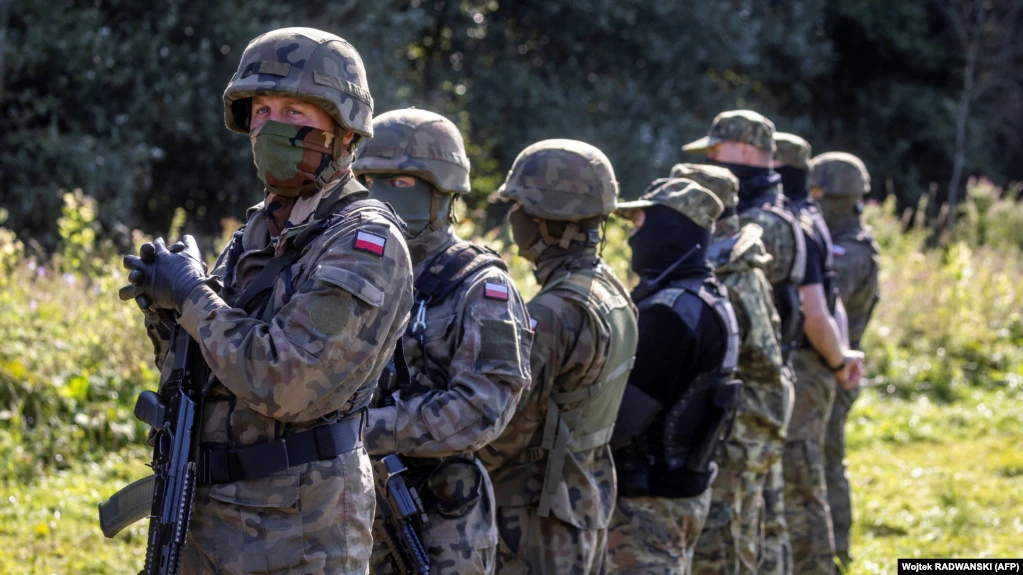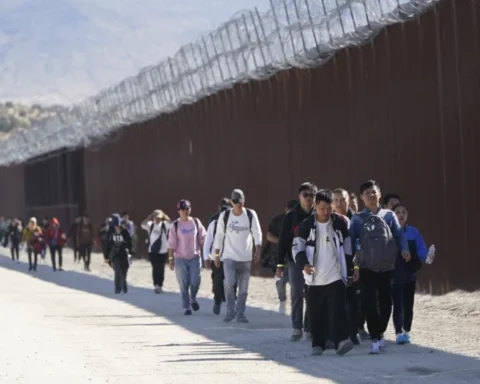“We have to stop these aggressive hybrid actions, which are carried out according to a script written in Minsk and at the hands of Mr. Lukashenka’s protectors,” Polish Prime Minister Mateusz Morawiecki said at a news conference in Warsaw on August 31.
Duda, a close ally of the ruling nationalist Law and Justice party (PiS), is likely to approve the 30-day measure, which would also cover parts of the Podlaskie and Lubelskie regions.
Interior Minister Mariusz Kaminski, speaking alongside Morawiecki, said a state of emergency would have little effect on the local population but would impose limits on outsiders within a 3-kilometer strip next to the border.
Last week, Poland began building a barbed-wire border fence in an effort to curb the flow from Belarusian territory of the migrants, most of whom are from Iraq and Afghanistan.
Relations between the West and Belarus have plunged since August 2020, when Lukashenka claimed victory in an election his opponents and Western countries say was rigged to hand him a sixth presidential term.
The vote triggered an unprecedented wave of protests across Belarus and a violent crackdown by the authorities.
The West refuses to recognize Lukashenka as the legitimate ruler of Belarus and has imposed sanctions on him, his inner circle, and businesses linked to him.
Brussels has accused Lukashenka of deliberately encouraging illegal migrants to cross into Poland, Latvia, and Lithuania in a form of “hybrid warfare.”
“Lukashenka’s regime decided to push these people onto Polish, Lithuanian, and Latvian territory in an effort to destabilize them,” Morawiecki said.
Poland also sees Belarus’s behavior as retaliation for Warsaw’s decision to give refuge to Krystsina Tsimanouskaya, a Belarusian athlete who refused to return home from the Tokyo Olympics after officials reportedly tried to punish her for criticizing her coaches on social media.
More than 30 migrants have been stuck on the border for more than three weeks between armed Belarusian guards on one side and armed Polish forces on the other.
Poland insists the group is on Belarusian soil and will not let the migrants approach Polish territory or request asylum. Activists say there are 32 people from Afghanistan, many of whom are now sick.
Marianna Wartecka of the refugee rights group Fundacja Ocalenie said eight of the migrants had kidney problems and five were suffering stomach ailments. The sickest person in the group is a 52-year-old woman who traveled from Afghanistan with her five mostly grown children, Wartecka said.
Over the weekend, 13 people from a different activist group, Obywatele RP (Citizens of Poland), were detained for trying to cut a new barbed-wire barrier going up on the border to protest what they called the “inhuman” behavior of Polish authorities.
Kaminski described the behavior of the activists as “scandalous.”
Lithuania was the first country bordering Belarus to register a sharp uptick in migrants crossing illegally from Belarus in July, eventually responding with a state of emergency and by vowing to use force to turn back illegal migrants at the Belarusian border.
This came after Lukashenka vowed to unleash “migrants and drugs” after the EU instituted the latest, and arguably toughest, round of sanctions against him and his government.
Those Western sanctions came after Lukashenka’s government forced a Ryanair flight from Athens to Vilnius to divert to Minsk on May 23, citing what is widely believed to have been a bogus bomb threat, and arrested Belarusian blogger and journalist Raman Pratasevich and his girlfriend, Russian citizen Sofia Sapega.
Lithuania has been a strong backer of Lukashenka’s democratic opponents, offering shelter to many fleeing Belarus, including opposition leader Svyatlana Tsikhanouskaya.
Latvia, which also borders Belarus, declared a state of emergency earlier this month after witnessing a surge of illegal migrant crossings.






